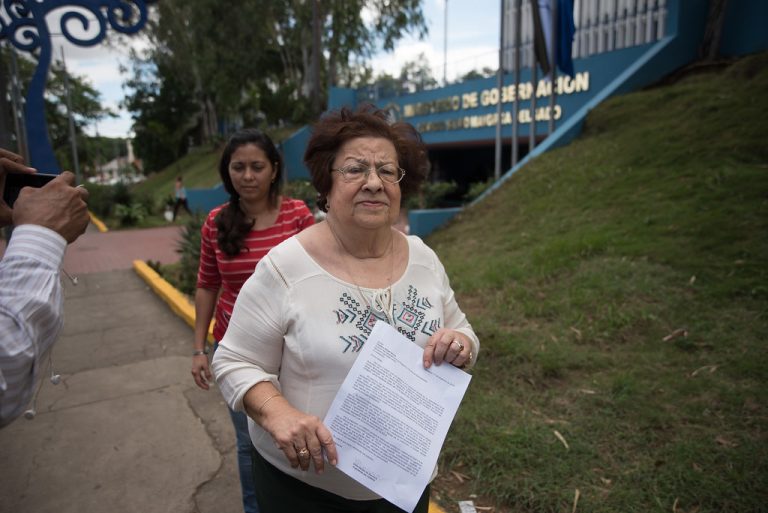11 de junio 2021

“NicaraguAmor” Cultural Caravan for Nicaraguans in the USA

PUBLICIDAD 1M
PUBLICIDAD 4D
PUBLICIDAD 5D
Ortega has dealt the electoral process a death blow,” states the veteran human rights attorney. “The hour has come to fight to dismantle this new fraud

Nunez warns that the Government manipulates the principle of non-repetition at its convenience
With the detention of seven opposition leaders, among them four presidential candidates, the Ortega regime has dealt a “death blow” to the electoral process. So asserts Vilma Nuñez, longtime human rights advocate and president of the Nicaraguan Center for Human Rights (Cenidh).
The seven latest political prisoners are being charged for supposed violations of Law 1055, the Law for the Defense in People’s rights to Independence, Sovereignty and Self-Determination for Peace. The law was steamrolled through Nicaragua’s National Assembly last year, one of a series of repressive new laws.
Vilma Nuñez spoke about the law’s larger implications in a June 9th interview, broadcast on the online television news program Esta Semana. She warned that the Ortega regime is utilizing Law 1055, “precisely for the aim it was created to serve”. That aim, in her view, is to facilitate “a generalized criminalization of everything that involves criticism or an opposing position.”
In the last 48 hours, three opposition leaders have been jailed or put under house arrest: Jose Pallais, a lawyer and member of the National Coalition; Violeta Granera, sociologist and opposition activist; and Jose Adan Aguerri, former president of the Superior Council of Private Enterprise. They join four presidential candidates for the opposition, who were also recently imprisoned: Cristiana Chamorro, Arturo Cruz, Felix Maradiaga, Juan Sebastian Chamorro.
According to the police, all are currently “under investigation” for “acts that undermine independence, sovereignty and the peoples’ self-determination, and for inciting foreign interference.”
Human rights lawyer Vilma Nuñez pointed out that Law 1055, under which they’re charged, is being challenged in Nicaragua’s Supreme Court as unconstitutional. The law, she states lacks any legal footing, because it violates the rights of Nicaraguans.
“This Law can’t stand up to the most minimal serious legal analysis. Definitively, it’s a law of a very general character, where the definitions are completely open. There’s no concrete indication of what concrete conditions would define a crime,” she notes.
The actions of Daniel Ortega’s regime, says Nuñez, have “severed the possibility of a civic solution through electoral participation.” Given this, she considers, what’s left to Nicaraguans is to “continue struggling, but not to think any longer that we can strive for a free and transparent electoral process (…) [now] we must continue struggling to dismantle the new fraud with which Daniel Ortega wants to perpetuate himself in power, with an appearance of legality.”
The Ortega regime has unleashed a witch hunt against those aspiring to the Presidency. On June 2nd, independent presidential candidate Cristiana Chamorro, former director of the shuttered Violeta Barrios de Chamorro Foundation, was detained. The opposition candidate is being held incommunicado, under house arrest. The regime claims she’s “under investigation” for an alleged case of money laundering in the Foundation she headed.
The Cenidh president sees the detention of opposition presidential candidates as part of Ortega’s strategy. “[His] objective [is] to destroy any possibility of an electoral defeat, in the event of a massive turnout against him at the ballot box. He’s doing this to be sure that a tiny group of participating voters from his party can give him the appearance of victory. So he can say he won.”
Nuñez added that this type of persecution and criminalization also seeks to “seed terror, so that everyone will be paralyzed. So that everyone will look for somewhere to hide and abandon the civic struggle.”
She denounced these actions to criminalize those who dissent from the Ortega regime. Such actions have become more pointed. They’re “being committed consecutively and repeatedly”, not only against members of the opposition, but also against any Nicaraguans that have demonstrated. The lawyer highlighted the existence of over a hundred political prisoners being held “without any legal basis, with fabricated crimes… they’re being deprived of their liberty and kept in subhuman conditions.”
In the face of this repressive wave from the Ortega regime, the human rights advocate asserts that the international community has assumed a “broad” role, “framed in the accustomed terms”. She sees this role as important, although she stressed the importance of internal action. “The internal political struggle has been left practically headless”. Nonetheless, Nicaraguans have a duty to “find a way to fortify the struggle.”
This article was originally published in Spanish in Confidencial and translated by Havana Times
Archivado como:
PUBLICIDAD 3M
PUBLICIDAD 3D